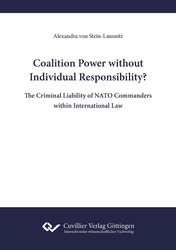| Departments | |
|---|---|
| Book Series (96) |
1381
|
| Nachhaltigkeit |
3
|
| Gesundheitswesen |
1
|
| Humanities |
2370
|
| Medienwissenschaften | 16 |
| Theology | 57 |
| Philosophy | 102 |
| Law | 424 |
| Economics | 851 |
| Social sciences | 418 |
| Sports science | 48 |
| Psychology | 233 |
| Educational science | 190 |
| History | 183 |
| Art | 111 |
| Cultural studies | 166 |
| Literary studies | 117 |
| Linguistics | 88 |
| Natural Sciences |
5408
|
| Engineering |
1795
|
| Common |
98
|
|
Leitlinien Unfallchirurgie
5. Auflage bestellen |
|
Advanced Search
Coalition Power without Individual Responsibility? (English shop)
The Criminal Liability of NATO Commanders within International Law
Alexandra von Stein-Lausnitz (Author)Preview
Extract, PDF (480 KB)
Table of Contents, PDF (190 KB)
This thesis deals with the individual criminal liability under international law of NATO commanders for crimes committed by their subordinates in the context of complex, multilateral command and control structures. After analysing the applicable law, the elements that must be fulfilled in order to be able to prosecute commanders and other superiors under the doctrine of Command Responsibility are comprehensively described and the Command, Control & Communication structures within NATO and in NATO-led operations explained. Subsequently, the doctrine of Command Responsibility is applied to the identified structures taking into account the role of a commander acting in a multilateral NATO operation, the role of the Troop Contributing Nation, the methods of conferral of powers as well as the de iure and de facto effective control of such a commander leading a multilateral force.
Die vorliegende Arbeit befasst sich mit der individuellen strafrechtlichen Verantwortlichkeit von NATO-Befehlshabern nach dem Völkerrecht für Straftaten ihrer Untergebenen im Rahmen komplexer, multilateraler Befehls- und Kommandostrukturen. Nach einer Darstellung des anwendbaren Rechts, werden die Voraussetzungen für eine Vorgesetztenverantwortlichkeit von Befehlshabern und anderen Vorgesetzten umfassend beschrieben und die Führungs-, Befehls- und Kommunikationsstrukturen innerhalb der NATO und bei NATO-geführten Einsätzen erläutert. Anschließend wird der Tatbestand der Vorgesetztenverantwortlichkeit unter Berücksichtigung der Stellung eines Befehlshabers in einem multilateralen NATO-Einsatz, der Rolle des truppenstellenden Staates, der Methoden der Befugnisübertragung sowie der de iure und de facto wirksame Kontrolle eines solchen Befehlshabers auf die ermittelten Strukturen angewandt.
| ISBN-13 (Hard Copy) | 9783736975620 |
| ISBN-13 (eBook) | 9783736965621 |
| Final Book Format | A5 |
| Language | English |
| Page Number | 318 |
| Lamination of Cover | matt |
| Edition | 1. |
| Publication Place | Göttingen |
| Place of Dissertation | Frankfurt (Oder) |
| Publication Date | 2022-01-11 |
| General Categorization | Dissertation |
| Departments |
Law
Public International law |
| Keywords | Administrative Control, Agent, Causal Nexus, Chief of Staff, Civilian Superiors, Command, Command Responsibility, Communication, Consensus Rule, Control, Customary International Law, Dayton Peace Accords, De facto, De iure, Effective Control, Executive Command, Failure to Prevent or Punish, ILC Draft Articles, Indicators, Intelligence, Joint Criminal Enterprise, Juridical Personality, Law of Armed Conflict, Military Justice, Military Superior, Multilateral Operations, Multiple Attribution, National Caveats, NATO, Operational Level, Organ, Political Level, Proof of Knowledge, Rules of the Organisation, Status of Forces Agreements (SOFA), Strategic Level, Superior Orders, Superior-Subordinate Relationship, Tactical Level, Transfer of Authority, Administrative Kontrolle, Agent, Kausalzusammenhang, Chef des Stabes, zivile Vorgesetzte, Befehlsstruktur, Vorgesetztenverantwortlichkeit, Kommunikationsstruktur, Konsensregel, Führungsstruktur, Völkergewohnheitsrecht, Friedensübereinkommen von Dayton, De facto, De iure, effektive Kontrolle, ausführende Befehlsgewalt, DARIO, Indikatoren, gemeinschaftliche kriminelle Unternehmung, Völkerrechtssubjektivität, Humanitäres Völkerrecht, Militärjustiz, Militärischer Vorgesetzter, Multilaterale Operationen, Mehrfache Zurechnung, Nationale Vorbehalte, NATO, Operative Ebene, Organ, Politische Ebene, Kenntnis, Regeln der Organisation, Abkommen über die Rechtsstellung (SOFA), Strategische Ebene, Befehl, Vorgesetztenverhältnis, Taktische Ebene, Unterstellungsverhältnis, Satellitenkommunikation, United Nations, satellite communications, Sicherheitsrat, Security Council, NATO-Standardisierungsabkommen, NATO Standardisation Agreement, Militärische Mindestanforderung, minimum military requirement |








